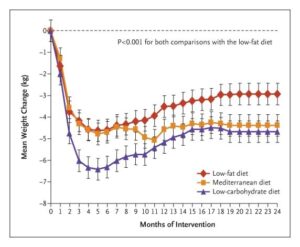Jump to: What is a low-fat diet? | Is a low-fat diet healthy? | Low-fat diets can support weight loss | Low-fat diets may not be sustainable for many people | Higher-fat diets support greater improvements in chronic disease risk | Take home message
Nutrition
Low-fat diet: Is it healthy?
Written by
Robbie Puddick (RNutr)
Content and SEO Lead
Medically reviewed by
Dr Rachel Hall (MBCHB)
Principal Doctor
9 min read
Last updated February 2026

Medication-assisted weight loss with a future focus
Start with Wegovy or Mounjaro, transition to habit-based health with our support


Is a low-fat diet healthy?
It has healthful components, such as the recommended intake of fruits, vegetables, and fish.
However, research suggests that dietary patterns containing more fatty acids are more beneficial for weight loss and lower the risk of chronic diseases such as cardiovascular disease and type-2 diabetes.
It’s possible you can achieve good health by eating a low-fat diet, but it might not be optimum.
There are also concerns about how sustainable the diet is, with multiple clinical trials showing that individuals on a low-fat diet typically struggle to adhere to the recommendations.
Recent research has also suggested that low-fat diets change dopamine (a neurotransmitter involved in motivation and reward) signalling in the brain that may encourage people to consume excessive amounts of energy-dense, ultra-processed foods.
There’s also the psychological issue with advising people to follow strict dietary patterns. Research suggests that when people are instructed to avoid or limit a particular food, they’re more likely to crave and overconsume it.
By telling people to avoid fat, it may focus too much on one nutrient that may lead to its overconsumption in the form of hyper-palatable, ultra-processed foods.
What is a low-fat diet?
The global recommendations to follow a low-fat diet date back to the 1970s when the U.S. became the first major country to recommend it in their dietary guidelines to lower cholesterol levels (particularly LDL cholesterol) and reduce our risk of heart disease; countries like the UK, New Zealand, and Australia soon followed suit.
A low-fat diet is based on a high intake of starchy carbohydrates, lots of fruits and vegetables, lean protein sources, and low amounts of saturated fat.
Unfortunately, adopting low-fat diets within our guidelines has coincided with an unprecedented rise in obesity, cardiovascular disease, and type-2 diabetes.
The focus on restricting fat has also allowed the food industry to develop cheap, hyper-palatable ultra-processed foods rich in refined starches and sugar and advertise them as ‘healthy’ as they’re low in fat.
While it’s possible to eat a whole-food low-fat diet and be healthy, it may not be the optimum way to eat.
Good evidence suggests that diets containing higher fat than is typically recommended are more beneficial for our health and reduce our risk of heart disease.
A low-fat diet aims to restrict total calories from all types of fat to less than 30% and daily calories from saturated fat to less than 10%, with some proponents of low-fat plant-based diets recommending less than 20% of calories coming from fat.
At the same time, it promotes a high intake of starchy carbohydrates as your primary energy source.
A low-fat diet encourages the consumption of:
- Starchy carbohydrates like bread, rice, pasta, and potatoes
- Whole grains
- Lentils and legumes
- Fruit
- Vegetables
- Lean protein sources like chicken and fish
- Reduced-fat or fat-free spreads and salad dressings
- Low-fat dairy products
- Low to moderate amounts of the so-called healthy fats (or good fats), monounsaturated fats and polyunsaturated fats
- Small amounts of vegetable oils and other high-fat foods like nuts and seeds
A low-fat diet discourages the consumption of:
- Fatty cuts of meat and other animal products high in fat
- Higher levels of cooking oils
- Full-fat dairy products
- Butter and cream
- High amounts of high-fat foods like avocado, nuts, and seeds
- Trans fats
At Second Nature, we don’t restrict fat or entire food groups. We provide evidence-based, sustainable solutions to help you ditch the fad diets and make weight loss feel easier.
You’re also provided with a registered dietitian or nutritionist to support you 1-1.
You can join people like Jo who’ve achieved all their health goals without having to count calories or eat bland low-fat foods. All you need to do is click here to take our health quiz.
Otherwise, keep reading as we analyse three lines of evidence looking at the impact of low-fat diets on health.
1) Low-fat diets can support weight loss
Losing weight is a simple physiological equation of burning more energy than you consume. Two ways to contribute to this equation are to eat less food and increase your daily activity.
Low-fat diets are no different in this sense. Trials comparing low-fat diets with other diets higher in fat have shown they can support modest levels of weight loss.
A randomised controlled trial compared four different diets and their impact on weight loss after 12 months:
- Atkins: High fat and high protein (a very low-carb diet)
- Zone: Low-carbohydrate
- Ornish: Very-low-fat diet
- LEARN: Low-fat diet
The study showed that the Atkins group achieved an average weight loss of 4.6kg, Zone 1.6kg, Ornish 2.2kg, and LEARN 2.6kg.
So while the Atkins group achieved greater weight loss among the four interventions, both the low-fat diets (Ornish and LEARN) experienced modest weight loss after 12 months.
Similarly, a trial compared a low-fat diet to a low-carbohydrate diet and their impact on weight loss after 12 months.
The study showed no significant difference between the two diets, with the low-carbohydrate group losing 6kg and the low-fat group 5.3kg after 12 months.
However, in a research environment, people are extrinsically motivated to adhere to the diet that they’ve been assigned.
Often there’s a financial incentive to complete the study that would motivate people even if they wouldn’t be able to outside the research setting.
Therefore, while these human trials have shown that low-fat diets can support weight loss, it’s unclear whether they suggest that the diet can be replicated in real-world environments.
Key points:
- From a physiological perspective, weight loss is a simple equation of eating fewer calories than you burn
- Clinical trials have shown that low-fat diets can support weight loss by cutting calories
- However, it’s unclear whether these trials suggest the diet’s a sustainable option in the long run
2) Low-fat diets may not be sustainable for many people
While weight loss is a simple equation from a physical perspective, the determining factors of weight loss maintenance are more complicated.
Our psychology and how much we enjoy our food can determine how well we can adhere to a specific diet.
A recent study showed that restricting dietary fat during weight loss changed dopamine signalling in the brain. This encouraged the consumption of ultra-processed foods rich in refined carbohydrates, added fat, and sugar.
This impact on dopamine may explain some results in randomised controlled trials that suggest low-fat diets are difficult to adhere to for many people.
A study looked at the impact of a low-fat and Mediterranean diet on risk factors for cardiovascular disease. Interestingly, the researchers also analysed how well participants adhered to their diets.
They found that those on the Mediterranean diet could meet their minimum target of eating at least 35% of their calories from fat and ate more, averaging around 40%.
In contrast, those on a low-fat diet struggled to adhere to their target of eating less than 30% of their calories from fat, averaging 32%. This suggests that strict low-fat diets may be difficult to maintain in the long term.
This is further supported by trials showing that diets higher in fat can help with weight loss in the long term.
A study compared a low-fat, low-carbohydrate, and Mediterranean diet and found that after two years, people following a low-fat diet lost an average of 3.3kg.
Comparatively, those following a Mediterranean diet lost 4.6kg and low-carbohydrate 5.5kg.

Key points:
- The long-term determinants of weight loss maintenance go beyond the simple equation of calories in VS calories out
- Research suggests low-fat diets change dopamine signalling during weight loss, increasing the consumption of ultra-processed foods
- Human trials comparing low-fat diets to those higher in fat suggest people find it hard to adhere to low-fat diets
- Research suggests that diets that don’t restrict fat support greater weight loss in the long term
3) Higher-fat diets support greater improvements in chronic disease risk
One of the leading theories supporting the introduction of low-fat diets in the 1970s is that they would bring the most health benefits, lower cholesterol levels, and reduce the risk of developing cardiovascular disease and other chronic diseases like type-2 diabetes and possibly some cancers.
However, recent human trials comparing diets of very similar design but with different levels of fat content have suggested otherwise, and dietary guidelines around the world are starting to shift.
Even the American Heart Association recently removed its guideline on an upper limit of fat intake.
A large randomised controlled trial involving over 7,000 participants investigated the effects of a Mediterranean diet supplemented with more fat – either in the form of added extra virgin olive oil or nuts – compared to a low-fat diet in individuals at risk of cardiovascular disease.
The study found that the Mediterranean diet with added extra virgin olive oil had a 31% lower risk of experiencing a cardiovascular event than those on the low-fat diet.
Likewise, the Mediterranean diet with added nuts had a 29% lower risk than those on the low-fat diet.
The Mediterranean diet with added extra virgin olive oil was also shown to lower the risk of death from all causes compared to the low-fat diet by 10%.
Secondary analysis of these participants also showed that the Mediterranean diet lowered the risk of developing type-2 diabetes by 52% and breast cancer in women by 68%.
Another randomised controlled trial with over 1,000 participants with existing cardiovascular disease investigated the effect of the Mediterranean diet on the risk of experiencing future cardiovascular events.
This is a secondary prevention trial, as they’re looking into the impact of the diet on individuals who already have the disease.
The study showed that a Mediterranean diet reduced the risk of experiencing another cardiovascular event, such as heart attack or stroke, by 27% compared to a low-fat diet.
Similarly, a recent randomised controlled trial compared a lower-fat DASH diet to a higher-fat DASH diet to determine their effects on weight loss outcomes and other risk factors for cardiovascular disease such as very-low-density lipoprotein (VLDL) and triglycerides.
The study showed that both the lower-fat and higher-fat DASH diets improved blood pressure to a similar degree.
But interestingly, the higher-fat DASH diet saw more significant reductions in VLDL and triglycerides – suggesting a higher fat intake led to greater improvements in overall risk for cardiovascular disease.
If you’d like to try a sustainable, balanced diet that doesn’t restrict your total fat intake, helps to manage your blood sugar levels, is heart-healthy, and doesn’t leave you obsessing over your calorie intake, click here to try our NHS-trusted meal plan.
Key points:
- One of the early theories used to promote a low-fat diet was that they would support a lower risk of chronic diseases such as cardiovascular disease, type-2 diabetes, and maybe cancer
- Large human clinical trials have shown that diets with a similar design but are higher in fat reduce the risk of chronic diseases and all-cause mortality compared to a low-fat diet
Take home message
Low-fat diets were promoted as the ultimate healthy diet for heart health in the 1970s.
This message was perpetuated to such an extent that it continues to this day, with many public health bodies still advocating its use. This is despite clear evidence suggesting that diets that don’t restrict the amount of fat we eat are more beneficial for our overall health.
This isn’t to say you can’t be healthy and enjoy a long life while eating a low-fat diet. If it’s a diet that you can enjoy and sustain, then that’s the most important thing.
However, the available evidence does not support the notion that a low-fat diet is the best for optimum health.
If you’re struggling to lose weight and achieve good health outcomes while trying to eat a low-fat diet, you might benefit from shifting to a diet that enables you to enjoy more fat.
This doesn’t mean you must follow a strict low-carb diet, like keto. But a diet that doesn’t restrict the number of servings of fat to unsustainable levels, as is often seen in modern low-calorie diets obsessed with counting grams of fat.
Evidence suggests you might find it more sustainable, and your long-term health will benefit too.
Medication-assisted weight loss with a future focus
Start with Wegovy or Mounjaro, transition to habit-based health with our support



Download our free, indulgent 7-day meal plan
It includes expert advice from our team of registered dietitians to make losing weight feel easier. Subscribe to our newsletter to get access today.
You might also like
As seen on
As seen on
